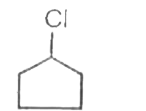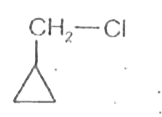Which of the following will react faster through SN1 mechanism ?
CH3CH2Cl
H2C=CH−CH2Cl

CH2=CHCl
The correct Answer is:B
To determine which of the given reactants will react faster through the SN1 mechanism, we need to analyze the stability of the carbocations formed during the reaction. The SN1 mechanism involves two main steps: the formation of a carbocation intermediate and then the nucleophilic attack. The rate of the reaction is primarily dependent on the stability of the carbocation.
1. Identify the Reactants: List the reactants provided in the question. For example, let's consider four different alkyl halides:
- 1-bromobutane
- 2-bromobutane
- tert-butyl bromide
- 1-bromo-2-methylpropane
2. Understand Carbocation Formation: In the SN1 mechanism, the first step is the departure of the leaving group (bromide ion in this case), leading to the formation of a carbocation. The stability of this carbocation is crucial for the reaction rate.
3. Evaluate Carbocation Stability:
- Tertiary Carbocations: These are the most stable due to hyperconjugation and inductive effects from surrounding alkyl groups. For example, tert-butyl carbocation is very stable.
- Secondary Carbocations: These are moderately stable. For instance, the carbocation formed from 2-bromobutane is more stable than that from 1-bromobutane.
- Primary Carbocations: These are the least stable and are generally not favored in SN1 reactions. For example, the carbocation from 1-bromobutane is less stable.
4. Rank the Reactants: Based on the stability of the carbocations formed:
- Tertiary carbocation (from tert-butyl bromide) > Secondary carbocation (from 2-bromobutane) > Primary carbocation (from 1-bromobutane).
5. Conclusion: The reactant that will react fastest through the SN1 mechanism is the one that forms the most stable carbocation. Therefore, tert-butyl bromide will react the fastest through the SN1 mechanism due to the stability of its tertiary carbocation.
Final Answer:
Tert-butyl bromide will react fastest through the SN1 mechanism.
- 1-bromobutane
- 2-bromobutane
- tert-butyl bromide
- 1-bromo-2-methylpropane
- Tertiary Carbocations: These are the most stable due to hyperconjugation and inductive effects from surrounding alkyl groups. For example, tert-butyl carbocation is very stable.
- Secondary Carbocations: These are moderately stable. For instance, the carbocation formed from 2-bromobutane is more stable than that from 1-bromobutane.
- Primary Carbocations: These are the least stable and are generally not favored in SN1 reactions. For example, the carbocation from 1-bromobutane is less stable.
- Tertiary carbocation (from tert-butyl bromide) > Secondary carbocation (from 2-bromobutane) > Primary carbocation (from 1-bromobutane).
Tert-butyl bromide will react fastest through the SN1 mechanism.
Topper's Solved these Questions
- HALOALKANES AND HALOARENES Book:PHYSICS WALLAHChapter:HALOALKANES AND HALOARENES Exercise:LEVEL - 2
Explore 15 Videos
- EQUILIBRIUMBook:PHYSICS WALLAHChapter:EQUILIBRIUMExercise:NEET PAST 10 YEARS QUETSIONS
Explore 22 Videos
- HYDROCARBONSBook:PHYSICS WALLAHChapter:HYDROCARBONSExercise:LEVEL-1
Explore 40 Videos
Similar Questions
Knowledge Check
Which of the following is least reactive towards SN2 mechanism ?
A BCH2=CH−CH2 - ClC
BCH2=CH−CH2 - ClC D
D
Which of the following will react faster with Lucas reagent ?
AButan-1-olBButan-2-olC2-Methyl propane-2-olD2-Methyl propaneWhich of the following factors does not favour SN1 mechanism ?
AStrong nucleophileBPolar solventCLow concentration of nucleophileD3∘ alkyl halide

Which of the following compounds will react faster in SN1. Reaction and why?
View SolutionWhich halogen compound in each of the following pairs will react faster in SN2 reaction :
(i)CH3Br or CH3I (ii)(CH3)3C−Cl or CH3−Cl
View SolutionWhich of the following react with HBr at faster rate ?
View SolutionWhich will react faster with NBS?
View SolutionWhich of the following statements is FALSE about SN1 mechanism ?
View Solution


